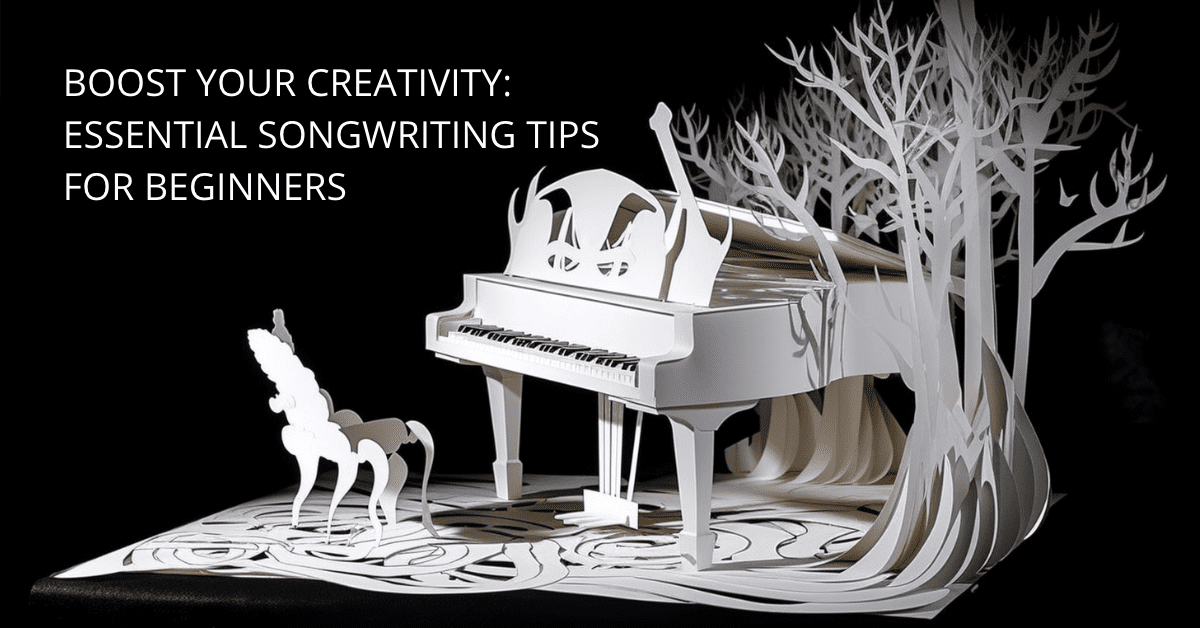
1. Embrace Your Uniqueness and Originality
We all have something unique to offer. So embrace your originality and let your individuality shine through your music.
2. Develop a Regular Songwriting Routine
Establish a routine to help you stay consistent and disciplined. Schedule dedicated songwriting sessions every day or week and prioritize them.
- Routine vs Inspiration: What’s More Important for Songwriting?
- The Struggles of Establishing a Songwriting Routine and How to Overcome Them
3. Master the Fundamentals of Music Theory
Understanding the basics of music theory, such as scales, chords, and harmony, will allow you to create more complex and captivating songs.
4. Explore Different Song Structures
Experiment with various song structures, such as verse-chorus-verse or ABABCB, to find the one that best fits your creative vision.
5. Build Your Vocabulary and Lyric-Writing Skills
Read books, listen to podcasts, and engage in conversation to expand your vocabulary and develop your lyric-writing skills.
6. Listen to and Analyze Various Genres
Expose yourself to different genres and styles of music to broaden your perspective and gather inspiration for your songwriting.
7. Keep a Songwriting Journal
Record your ideas, lyrics, and melodies in a journal to capture your creative thoughts and prevent them from slipping away.
8. Collaborate with Other Musicians
Collaborate with fellow songwriters and musicians to exchange ideas, learn from one another, and improve your skills.
9. Experiment with Different Instruments
Try playing different instruments to discover new sounds, textures, and perspectives for your compositions.
10. Find Your Unique Songwriting Process
Develop a personal songwriting process that works for you, whether it's starting with a melody, a chord progression, or a lyrical theme.
11. Learn from the Greats
Study the work of legendary songwriters and composers to understand their techniques and apply them to your own music.
- John Mayer on Writing Songs As Fast As You Can
- Watch Taylor Swift Share Songwriting Tips In Revealing GQ Interview
12. Understand Your Target Audience
Know who you're writing for, whether it's a specific demographic, a genre, or yourself, and tailor your music accordingly.
13. Use Evocative Imagery in Your Lyrics
Paint vivid pictures with your words to evoke emotions and tell captivating stories in your songs.
14. Experiment with Songwriting Software
Explore songwriting software and apps to help you streamline your workflow and spark creativity.
15. Practice Patience and Perseverance
Songwriting can be challenging, but with patience and perseverance, you'll become a better songwriter over time.
16. Be Open to Constructive Criticism
Seek feedback from trusted sources and learn to accept constructive criticism to help you grow as a songwriter.
17. Attend Songwriting Workshops and Seminars
Participate in workshops and seminars to learn new techniques and network with other songwriters and industry professionals.
18. Stay Curious and Keep Learning
Keep an open mind and never stop learning to expand your songwriting skills and stay ahead of the curve.
19. Balance Simplicity and Complexity
Strike a balance between simplicity and complexity in your songwriting to create memorable and engaging music.
20. Use Your Life Experiences for Inspiration
Draw from your personal experiences, emotions, and observations to create authentic, relatable songs.
21. Set Clear Goals for Your Songwriting
Define your songwriting goals and measure your progress to stay motivated and on track.
22. Don't Be Afraid to Take Risks
Step out of your comfort zone and experiment with new sounds, styles, and techniques to discover your true creative potential.
23. Emphasize Your Chorus or Hook
Create a memorable and impactful chorus or hook that will keep your listeners humming your song long after they've heard it.
24. Utilize Dynamic Contrast in Your Music
Incorporate dynamic contrasts within your songs, such as changes in volume, tempo, or instrumentation, to maintain listener interest and create emotional depth.
25. Write Songs for Specific Purposes
Craft songs for particular purposes, like film and television placements or themed albums, to challenge yourself and broaden your skillset.
- Writing the Perfect Holiday Song: Melodies, Lyrics, and Joy
- Your Guide to Writing the Perfect Summer Song
- Crafting the Ultimate Sports Anthem: Tips for Songwriters
26. Utilize Repetition Effectively
Employ repetition to emphasize important lyrical themes or musical motifs, but be careful not to overdo it and risk losing your audience's interest.
27. Edit and Revise Your Songs
Review your songs and refine them until they accurately represent your creative vision and resonate with your target audience.
28. Stay Organized and Efficient
Keep your songwriting workspace organized, and manage your time effectively to maximize productivity.
29. Embrace Technology and Innovation
Leverage modern technology and innovative tools to enhance your songwriting process and stay relevant in the ever-evolving music landscape.
30. Understand the Power of Storytelling
Harness the power of storytelling to craft emotionally compelling and memorable songs that resonate with your audience.
- Crafting Engaging Narratives: The Impact of Three-Act Story Structure on Songwriting
- From Idea to Song: How Storyboard Templates Can Revolutionize Your Songwriting Process
- Enhancing Your Lyrics with Short Story Techniques for Unparalleled Focus
31. Prioritize Your Emotional Connection to the Song
Focus on connecting emotionally with your music, ensuring it resonates with both you and your listeners.
32. Break the Rules (Occasionally)
Feel free to bend or break conventional songwriting rules when it serves your creative vision, but understand when to stick to proven methods.
33. Practice Good Time Management
Balance your songwriting time with other important aspects of your life, such as family, friends, and self-care, to maintain a healthy and sustainable creative lifestyle.
34. Seek Inspiration in Unexpected Places
Look beyond music for inspiration, such as in nature, visual art, or literature, to bring fresh ideas and perspectives to your songwriting.
- 10 Amazing Song Plots To Inspire Your Songwriting Right Now
- 13 Inspiring TED Talks To Help You Be An Outstanding Songwriter
35. Maintain a Healthy Work-Life Balance
Avoid burnout by balancing your songwriting career and personal life, giving yourself time to recharge and stay inspired.
36. Stay True to Your Artistic Vision
Remain focused on your unique artistic vision rather than solely chasing trends or commercial success.
37. Accept Rejection and Failure as Part of the Process
Learn to handle rejection and failure as inevitable aspects of a creative career, using them as opportunities for growth and self-improvement.
38. Stay Open to New Ideas
Keep an open mind and embrace new ideas, even if they challenge your preconceived notions about songwriting.
39. Develop a Strong Work Ethic
Cultivate a strong work ethic to stay disciplined, motivated, and committed to your songwriting goals.
40. Believe in Yourself and Your Abilities
Have faith in your talent and potential as a songwriter, and trust in your ability to grow, adapt, and achieve success.
Conclusion
Songwriting is an art form that requires dedication, passion, and continuous growth. By implementing these 40 essential tips for beginners, you'll be well on your way to developing your unique style, refining your craft, and sharing your music with the world.
Frequently Asked Questions
1. How long does it take to become a proficient songwriter?
The time it takes to become proficient in songwriting varies for each individual. However, consistent practice, patience, and a commitment to learning and growth will eventually lead to proficiency. Remember, the journey of improvement is ongoing, so keep learning and challenging yourself.
2. Can someone with no musical background become a successful songwriter?
Yes, it's possible for someone with no musical background to become a successful songwriter. However, a strong passion for music, dedication to learning, and perseverance can help you develop the necessary skills over time.
3. Is it necessary to know how to play an instrument to be a good songwriter?
While it's not a strict requirement, learning to play an instrument can greatly enhance your songwriting skills by expanding your understanding of music theory, harmony, and melody. It can also make the process of composing and arranging your songs more accessible.
4. What are some common mistakes made by beginner songwriters?
Common mistakes beginner songwriters make include overcomplicating their songs, being overly attached to their first ideas, not seeking feedback, and neglecting the importance of editing and revising their work.
5. How can I find other songwriters and musicians to collaborate with?
You can find collaborators by attending local music events, joining online forums or social media groups, participating in songwriting workshops, or using platforms like SoundCloud or Bandcamp to discover and connect with like-minded musicians.

